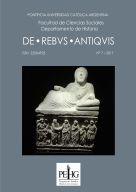Social ascension and political conflicts in pronconsular Africa : the case of Aemilii and Sicinii in Oea (II Century AD)
Keywords:
Roman Empire, Oea, Urban elite, Apuleius of Madaura, ApologiaAbstract
Between the first and second centuries AD, Oea was added to the Roman Empire and underwent a series of social and political changes, verified to some extent by the testimony of the north african Apuleius, who lived in the city between the years of 157 and 159. Through his Apology and with the help of the remaining epigraphic corpus of Oea, political and family conflicts within the aristocracy of Oea are evident, evidencing the different strategies employed by the local elite in order to enter into society roman. Such conflicts demonstrate that expression "provincial city elite", commonly used to refer to elite of the different
regions dominated by Rome, most often reproduces a generalization that masks a
considerable heterogeneity. To a great extent, one can not speak of a homogeneous, politically and culturally united and monolithic elite within the many Roman cities of North Africa. What is observed is the existence of different groups, with different interests and - not infrequently - divergent, each group being able to respond in a different way to the new reality coming from the submission of its native city to the Roman Empire
Downloads
Downloads
Published
How to Cite
Issue
Section
License










